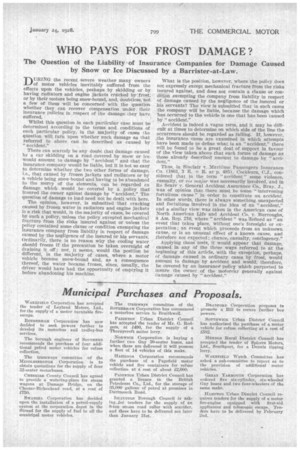WHO PAYS FOR FROST DAMAGE?
Page 43

If you've noticed an error in this article please click here to report it so we can fix it.
'The Question of the Liability of Insurance Companies for Damage Caused by Snow or Ice Discussed by a Barrister-at-Law.
TyURING the recent severe weather many owners _Llof motor vehicles inevitably suffered from the effects upon the vehicles, perhaps by skidding or by having radiators and engine jackets cracked by frost, or by their motors being snow-bound, and; doubtless, not a few of them will be concerned with the question whether they can recover compensation under their insurance policies in respect of the damage they have. suffered.
Whilst this question in each particular case must be determined according to the terms and conditions of each particular policy, in the majority of cases the question will turn upon whether such damage as that referred to above can be described as caused by "accident."
There can scarcely be any doubt that damage caused by a car skidding on a road covered by snow or ice would amount to damage by " accident " and that the Insurance company would be liable, but it is not so easy to determine whether the two other forms of damage,
that caused by frozen jackets and radiators or by a vehicle being snow-bound and having to be abandoned to the mercy of the elements, can be regarded as damage which would be covered by a policy that• insured the owner against damage by "accident," The question of damage to load need not be dealt with here.
The opinion, however, is submitted that cracking caused by frozen water in radiators and engine jackets is a risk that would, in the majority of cases, be covered by such a policy, unless the policy excepted mechanical fracture from the risks insured against or unless the policy contained some clause or condition exempting the insurance company from liability in respect of damage caused by the negligence of the insured or his servants. Ordinarily, there is no reason why the cooling water should freeze if the precaution be taken overnight of draining it off ; nor, it seems, would the position be different, in the majority of cases, where a motor vehicle became snow-bound and, as a consequence thereof, the water became frozen, since, usually,. the driver would have had the opportunity of emptying it before abandoning his machine. What is the position, however, where the policy does not expressly except mechanical fracture from the risks insured against, and does not contain a clause or condition exempting the Company from liability in respect of' damage caused by the negligence of the insured or Iii s servants? The view is submitted that in such cases the company will be liable, because the damage, which 'has. occurred to the vehicle is one that has been caused by "accident."
Accident is indeed a vague term, and it may be difficult at times to determine on which side of the line the occurrence should be regarded as falling. If,,however, the insurance cases are examined in which attempts have been made to define what is an "accident," there wilt be found to be a great deal of support in favour of the view taken above that such forms of damage as those already described amount to damage by " accident."
Thus, in Sinclair v. Maritime Passengers Insurance Co. (1861, .3 B.. + E. at p. 485), Cockburn, C.J., 'considered that in the term " accident " some violence, casualty, or ?pis major was necessarily involved, and in Re Scar y. General Accident Assurance Co., Bray, J., was of opinion that there must be some "intervening fortuitous cause" in order to eonstitute an accident. In other words, there is always something unexpected and fortuitous involved in the idea of an "accident," and a similar view was taken in the American case of North American Life and Accident Co. v. Burroughs, 8 Am. Rep. 216, where " accident " was "defined as "an event that takes place, without one's foresight or expectation; an event which proceeds from an unknown cause, or is an unusual effect of a known cause, and therefore not expected ; chance, casualty, contingency."
Applying these tests, it would appear that damage, caused in any of the three ways referred to at the beginning of this article, with the exception, perhaps, of damage caused in ordinary cases by frost, would amount to damage by accident and would, therefore, be covered by an insurancce policy which purported to insure the owner of the motorcar generally against damage caused by "accident."




































































































